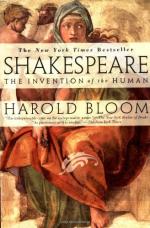|
This section contains 569 words (approx. 2 pages at 400 words per page) |

|
Shakespeare: The Invention of the Human Summary & Study Guide Description
Shakespeare: The Invention of the Human Summary & Study Guide includes comprehensive information and analysis to help you understand the book. This study guide contains the following sections:
This detailed literature summary also contains Topics for Discussion and a Free Quiz on Shakespeare: The Invention of the Human by Harold Bloom.
Many authors have published critiques of the plays of Shakespeare. Some of the best known romantic critics are Hazlitt, W. H. Auden and A.C. Bradley. Contemporaries of Shakespeare include the playwrights Ben Jonson, a critic of Shakespeare and Christopher Marlowe, a playwright who had much influence on Shakespeare. The author, Harold Bloom begins this monumental book with the thesis that Shakespeare with his plays invented the modern notion of human personality. Actually, this claim is based largely on the famous characters Hamlet, Falstaff, Iago, Macbeth, Edmund, Edgar, Lear, Rosalind and Cleopatra, who appear in a total of 8 plays. While the plays, Hamlet, Macbeth, Henry IV Part I and II, King Lear, Othello, As You Like It, and Antony and Cleopatra, are considered by the author to be Shakespeare's masterpieces, many other plays have characters of a nearly similar quality. The author has mined the rich literature of Shakespeare criticism to make his evaluation of Shakespeare and his plays.
A particularly strong influence on the author's interpretation of Shakespeare is the philosopher Friedrich Nietzsche. Nietzsche had the idea that Hamlet thought too well, and even though often Dionysian, was not nearly Dionysian, or wild and spontaneous enough. Another interesting observation of the author is that many of Shakespeare's plays were influenced and were a response to the plays of Christopher Marlowe. Shakespeare also may have become politically cautious after the murder of Marlowe by English intelligence agents. Marlowe's Doctor Faustus, mainly an out-of-control evil character, is answered by the late Shakespeare play The Tempest, with the conflicted sorcerer Prospero, who ultimately abandons his sorcery to return to his post as the Duke of Milan. In Marlowe's Jew of Malta, Barnabas' wickedness is stopped by boiling him in a pot of oil. In Shakespeare's play, The Merchant of Venice, Shylock is forced to match his wits in court with Portia disguised as a man, and to admit guilt and to convert to Christianity. The author sees Shakespeare as endowing his characters with a superb amount of inward thinking that Marlowe's characters, despite their loud speeches, never had.
The author looks at the first 9 plays by Shakespeare as rehearsals for the greatness to come. Already, the play Julius Caesar had a fantastic compactness and unity to it, and Romeo and Juliet had been a popular play because it deserved to be. Shakespeare's comedies had begun to introduce introspective characters such as Shylock and the ever resourceful female character Rosalind in As You Like It. The history plays had been far from boring, with the play Henry IV being the home of the rollicking and ironic character Falstaff, probably the favorite of all the author's characters. Henry V had been written as a great patriotic play with great speeches, though it had shown that Shakespeare could also still construct plays without characters saying soliloquies. This had ushered in the era of Shakespeare's greatest plays such as Hamlet, Othello, King Lear, Macbeth, and Antony and Cleopatra. The late plays of Shakespeare are the most troubling for the author. The Tempest is one of Shakespeare's great plays, but the author complains it barely has any plot. The conflicting forces of good and evil do not leave the viewer with easy choices in this problematic play. The author is not sure whether to regard Prospero, the leading character of the Tempest, as being the center of a comedy or a tragedy.
Read more from the Study Guide
|
This section contains 569 words (approx. 2 pages at 400 words per page) |

|



